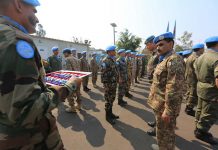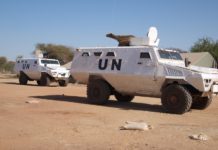With the 40th anniversary of MSF, the book « Acting at any price ? » reveals the MSF experience in humanitarian negotiations and contribute to the reflexion initiated by the association in 1992 with the series of « populations in danger »’s books. Relating the evolution of humanitarian goals, the resistance to these goals and the political arrangements that overcame this resistance (or those which failed to do so), this book intends to contribute to the debate on the practices and the objectives of contemporary humanitarian action.
Assassinations, kidnappings, evictions, restrictions or prohibitions of movement, imposed silence: those were some of the obstacles faced by NGOs trying to come to the rescue of populations affected by war, epidemics or natural disasters.
Are these events increasing, reflecting a shrinking of « humanitarian space »? This idea has been claimed by many actors of assistance since the beginning of the 2000s. The confusion between soldiers and humanitarians, accentuated by the resurgence of Western intervention post-11 September, would be accompanied by a reassertion of sovereignty of the post-colonial States and a discredit of aid agencies.
In the book “ Acting at any price?”, MSF provides another reading of the difficulties encountered by humanitarian actors: unlike the speech deploring a « shrinking of the space », thus relieving emergency actors of their responsibilities in the conquest and the defense of their workspace, this book demonstrates that there is no criteria for determining the legitimacy of the humanitarian action which would be valid in all times and all places, whose recognition would be evident once the fog of the military-humanitarian confusion would be dissipated and the humanitarians protected from political contamination. On the other hand, there is a space for negotiations, power struggles and self -interested relationships between humanitarian actors and authorities.
The political recovery of assistance, denounced by numerous practitioners and observers of humanitarian action is not a diversion of its vocation but the main condition of its existence. Far from being the result of a policy with a virtuous appearance or the juridico-moral authority lent to humanitarian norms, the freedom of action of aid agencies must be negotiated. It depends on their capacities to make themselves indispensable, to identify tactical alliances with all kind of powers- government, army, combatants, interests ‘groups, institutions, liable to promote their actions.
What is an acceptable compromise for MSF? This is the key question of the book which provides concrete experiences of negotiations of MSF through a critical analysis. The authors, who were involved in MSF’ actions for the most of all, relied on the archives of the association, interviews with the protagonists of each of the stories and their own experience to do this investigation.
The first part of the book is composed of twelve stories illustrating the association’s history, in Afghanistan, Sri Lanka, Yemen, Ethiopia, Nigeria, Somalia, Pakistan, South Africa, Burma, India, Palestinian territories and France. In each of these case studies, authors show the common and divergent interests between MSF and the other organizations or institutions- a politico-military movement using humanitarian assistance to build its national and international legitimacy, States seeking to isolate or reinforce a system, soldiers refusing any distinction between the combatants and no combatants, authorities more concerned by political consequences of an epidemic than its impact on health, or activist movements fighting for a reform project of their societies.
The authors of the chapters of the second part of the book show the evolution of MFS choices through its experiences but also its ideologies associated to forty years of wars, public health and natural disasters.
This brief survey of the association’s long and contemporary history reveals the conditions of a political autonomy for humanitarian actors as MSF: being in a position to choose its alliances regarding to its goals, without any allegiance nor loyalty concern. In that way, MSF is an unstable and disloyal partner. Its lability can be explained by the necessity to identify the opening of favorable political spaces, in other words, moments when MSF can seize the opportunity to reduce the number of dead and the intensity of pains. This necessity of medical efficiency must be accompanied of an intention of influencing States, in a material or symbolic way, to get a free dialogue with populations, to control the rescue chain and to reassess constantly the situation. Whatever the situations, the important thing to know is the association’s policy and to keep the association away from the limit, blurred but real, beyond which assistance to victims turns imperceptibly into support for the oppressors.
Translation : Morgane Chatel
« Agir à tout prix ? Négociations humanitaires : l’expérience de Médecins Sans Frontières» sous la direction de Claire Magone, Michaël Neuman, Fabrice Weissman
Grotius International
Derniers articles parGrotius International (voir tous)
- 54h pour innover pour l’Afrique – 13 juin 2019
- Guide Pratique Des Associations Et ONG Internationales Au Togo – 26 avril 2019
- Paul Salvanès, « La haine qu’il faut » – 13 mars 2018







